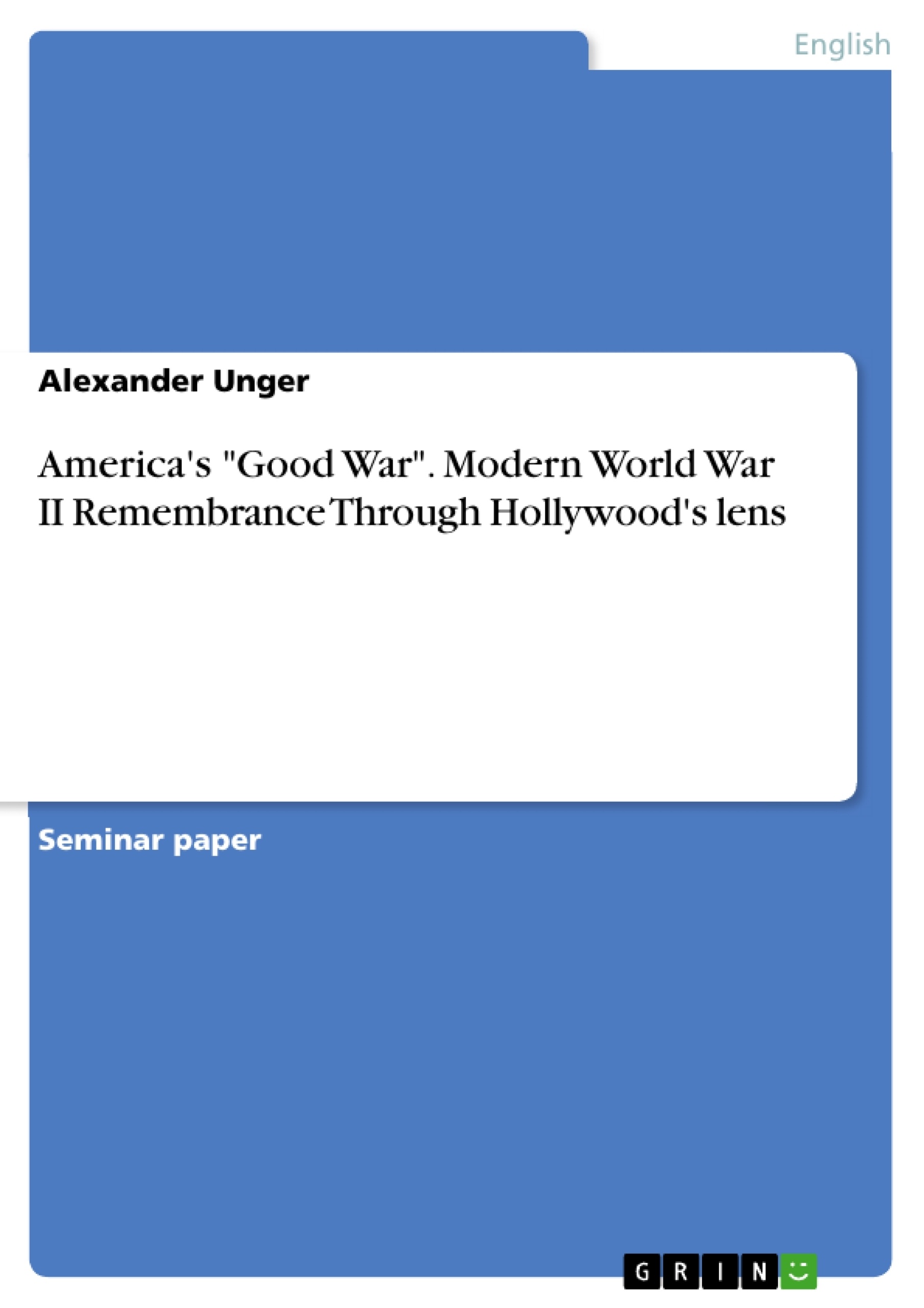In the paper I will deconstruct the myth of the “Good War” with regard to its formation and the accuracy of its crucial points. Focus will be laid on both the predominant narrative of the war per se and the Americans who fought in it respectively remained at home. Subsequently, I will turn to the images of the Second World War, Hollywood – via constant repetition – has ingrained into the American cultural mind. At this, the genre of the “combat film” deserves special attention.
Not only did the combat film convey powerful ideas about war and those who fight in it, but it also served as foundation for later filmmakers interested in the topic. In a final step, I will juxtapose two recent cinematic projects relating to the Second World War by two of Hollywood's greatest current filmmakers – Steven Spielberg's “Saving Private Ryan” (1998) and Clint Eastwood's companion films “Flags of Our Fathers” and “Letters from Iwo Jima” (2006) – and, in search for elements of the “Good War” narrative, discuss their respective treatment of the subject.
To most Americans, World War II is the “Good War”. Unlike the nations of Europe and Asia, the United States suffered no invasions of its homeland, no area bombings of its cities, and no mass killing of its civilians. It was a war of high technology, fought by an extraordinary generation of heroic and courageous men who, when the task arose, stepped up to defend their country and to bring human rights, freedom, and democracy to those in need. The enemy was well-defined and the cause a worthy one. World War II lifted the nation out of the Great Depression and created a new world order that left the United States at the pinnacle of its power. An American society in transition gave rise to the middle class while opening up unprecedented opportunities for minorities and women. To this day, people feel that the prosperity and freedom they enjoy is the result of the sacrifices of the Americans that won the war.
Inhaltsverzeichnis (Table of Contents)
- Introduction
- The myth of the "Good War"
- Screening the "Good War"
- Conclusion
Zielsetzung und Themenschwerpunkte (Objectives and Key Themes)
This work aims to critically examine how the Second World War has been constructed as a "Good War" in American collective memory, focusing on the influence of Hollywood films. The author explores the formation and accuracy of this myth, analyzing how Hollywood films have perpetuated it.
- The "Good War" narrative and its impact on American memory
- The role of Hollywood films in shaping perceptions of World War II
- The depiction of war and its protagonists in combat films
- The historical accuracy and ethical considerations of war movies
- The portrayal of World War II in recent cinematic productions
Zusammenfassung der Kapitel (Chapter Summaries)
- Introduction: This chapter introduces the concept of World War II as the "Good War" in American memory and outlines the key questions the work seeks to address. It discusses the historical context, the role of Hollywood films in shaping public perception, and the importance of understanding how memory and history interact.
- The myth of the "Good War": This chapter deconstructs the "Good War" myth, exploring how World War II has been simplified and idealized in American collective memory. It analyzes the historical context, political and social factors that contributed to this myth, and the role of influential figures in shaping public opinion.
- Screening the "Good War": This chapter examines how Hollywood films have contributed to the perpetuation of the "Good War" myth. It analyzes the genre of the "combat film" and its impact on public perceptions of war, focusing on how these films portray the American experience of World War II.
Schlüsselwörter (Keywords)
This work focuses on key concepts such as the "Good War" myth, American collective memory, Hollywood films, combat films, historical accuracy, and the influence of cultural mass production on perceptions of historical events. The author analyzes the relationship between history, memory, and cinematic representation, drawing upon works by prominent scholars in the field of historical memory studies.
Frequently Asked Questions
What is meant by the myth of the "Good War"?
The "Good War" myth refers to the idealized American narrative of WWII as a morally clear conflict fought by a heroic generation to defend freedom and democracy.
How has Hollywood shaped the American memory of WWII?
Hollywood films, especially the "combat film" genre, have ingrained specific images and narratives into the cultural mind through constant repetition and dramatization.
Which modern films are analyzed in this context?
The paper juxtaposes Steven Spielberg’s "Saving Private Ryan" with Clint Eastwood’s "Flags of Our Fathers" and "Letters from Iwo Jima."
What are the characteristics of the "combat film" genre?
Combat films convey powerful ideas about war, heroism, and national identity, often serving as the foundation for how the public perceives historical military events.
Does the paper question the historical accuracy of these films?
Yes, the work deconstructs the narrative to explore the accuracy of crucial points and the ethical considerations of cinematic representation.
- Arbeit zitieren
- Alexander Unger (Autor:in), 2012, America's "Good War". Modern World War II Remembrance Through Hollywood's lens, München, GRIN Verlag, https://www.grin.com/document/1007744



